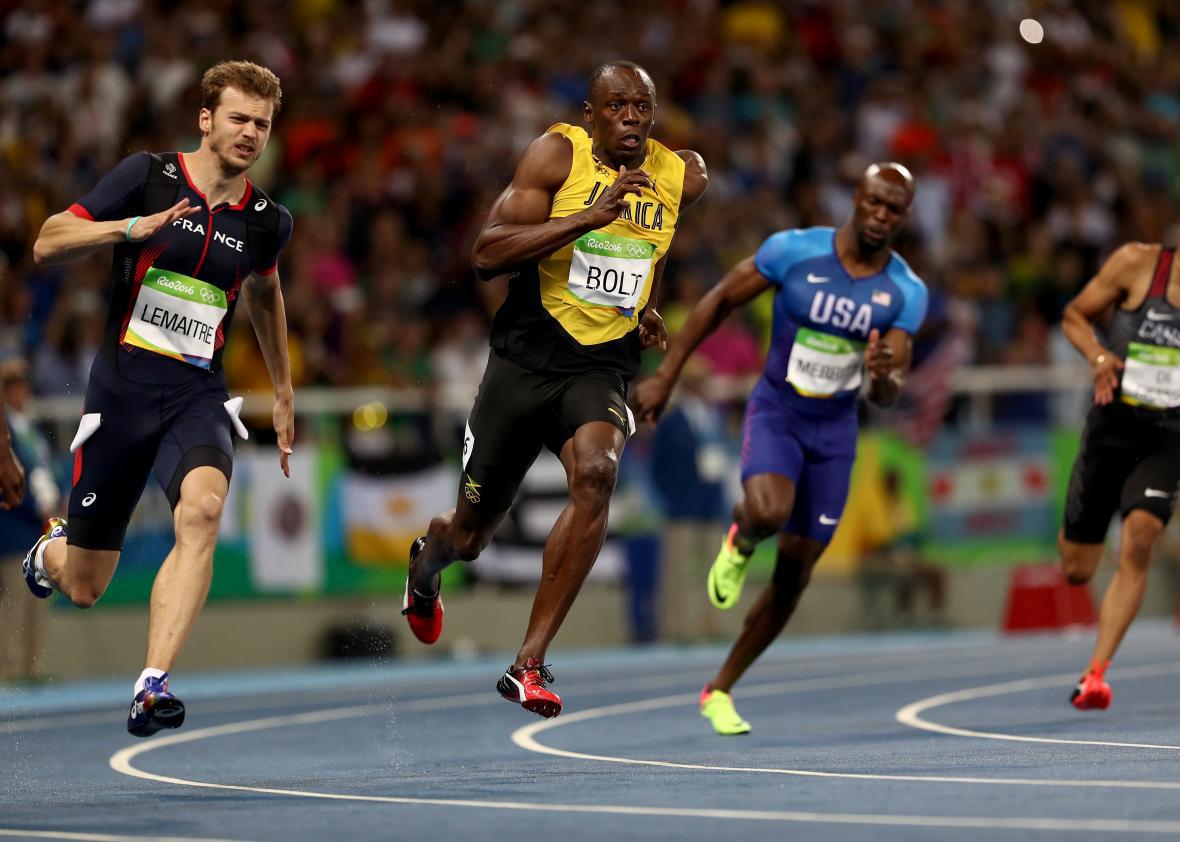On Thursday night, the world’s fastest man slowed down. Usain Bolt won the 200-meter dash in Rio de Janeiro, as expected, sprinting far ahead of the field and winning his eighth Olympic gold medal. Objectively, it was a great performance. By the time Bolt got to the straightaway, he was so far ahead of everybody else that there could be no doubt about the eventual outcome. The only question was whether he could challenge the world record of 19.19 seconds he’d set in Berlin in 2009. Bolt strained down the backstretch, his face fixed into a grimace. He dipped at the line. When the time came on the scoreboard, it was … not that great. He didn’t break a world record. In fact, he didn’t come close.
Bolt’s winning time of 19.78 seconds would have been a personal best for all but one of the other runners in Thursday’s 200-meter final. The Jamaican, though, had run faster 18 separate times, including in every Olympic and world championship final since he emerged as the world’s fastest man in 2008. The rainy conditions in Rio on Thursday night were suboptimal, and the weather surely affected Bolt’s performance. An absence of serious competition probably played a part in Bolt’s relatively slow time, too. With no competitor to push him to world-historical dominance, Bolt simply ran fast enough to win.
Bolt has been at his best these Olympics in the early rounds of the 100 and 200, when he faced no real pressure to improve upon his own formidable records. He ran better—smoother, freer, and faster, at least until slowing down in the closing meters—in the 100 and 200 semifinals than in either final. Wednesday night’s 200-meter semifinal was Bolt’s best moment so far in Rio. As he neared the finish line, he turned and smiled at the young Canadian sprinter Andre De Grasse and De Grasse—who’s been touted throughout these games as Bolt’s possible successor—turned his head and smiled back.
He ran 19.78 in that semifinal, matching his time in Thursday’s final, despite not trying to run his fastest at all. At this stage in his career, Bolt’s maximum effort cannot possibly match his max effort from 2008 and 2009, when he was at his physical peak. When he’s relaxed, running free and easy and toying with the fools who dare to share a track with the king of the sprints, he still appears to be at the height of his powers.
It’s only when Bolt faces self-imposed pressure to live up to his younger self that he seems to stumble. As the runners took their marks on Thursday, he looked relaxed and confident. He did a little samba, blew a kiss to the camera, and raised his arms high and wide, predicting victory before he’d moved an inch. He won the race, as he and everyone else knew he would, but he didn’t bend time to his will. Bolt had talked in the lead-up to the race about breaking the 19-second barrier, an absurd goal that even the younger, fitter Usain Bolt never got close to reaching. At the end of the race, when he’d covered 200 meters in closer to 20 seconds than 19, he told NBC’s Lewis Johnson, “I wanted a faster time. I felt good, but when I came into the straight, my body wouldn’t respond to me. I guess it’s just age and all the rounds just taking a toll.”
“The 19.79 [later revised down to 19.78] is such an incredible time, but you’re still frustrated at that time?” Johnson replied.
“Yeah, I wanted to run faster. I really wanted to go faster,” Bolt said. “I think it would’ve helped if I had somebody faster in front of me to really pull me to run the corner a little faster. Came into the straight, I tried, but my body would not respond to me. Just one of those things. But I’m happy.”
This is what an aging athlete looks like and sounds like when that aging athlete is the fastest man in history. Bolt used to be able to pull himself along—to chase Michael Johnson’s ghost, and then to hunt down his own record times. Now, when he needs someone else to pull him along the track, he’s not getting any help, because he’s still faster than every other human. Justin Gatlin had made noise about challenging Bolt in the 200, but Gatlin didn’t even make it out of his heat. In the semis, it looked like De Grasse could push him to greatness, but the Canadian isn’t quite ready to challenge Bolt in what’s always been his best event.
Back in his younger days, Bolt raced against himself, and he always won. Now, he’s losing the race against time. On Thursday night, he ran roughly the same race that Carl Lewis did when he won gold in 1984 and that Tommie Smith did when he won the 200 in Mexico City in 1968. In 2008 and 2012, Bolt ran times that seemed like they were from a distant future. Now, when he’s running times from the past, he’s still the best in the world by far.
